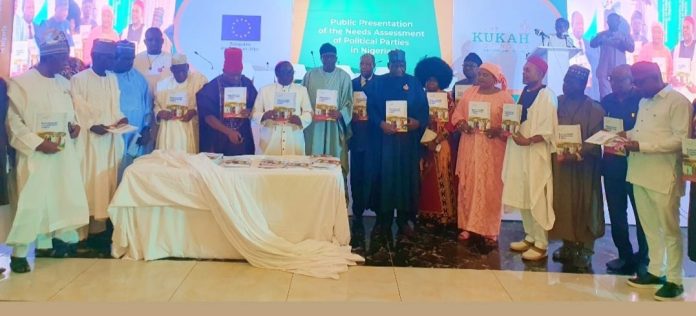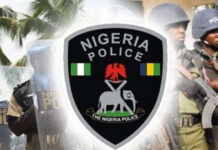Senate President Godswill Akpabio and Bishop Mathew Kukah have stressed the need to reposition political parties to build a democratic culture that fosters inclusivity, transparency and accountability.
They made the call at the Public Presentation of the Needs Assessment of Political Parties in Nigeria, organised by Kukah Centre with support from European Union Support to Democratic Governance in Nigeria (EU-SDGN), in Abuja.
Akpabio, who was represented by Sen. Victor Umeh, said repositioning political parties would help to restore public trust and confidence in them, ensuring that they remained true representatives of the aspirations of the people.
He said that this was imperative because lack of accountability, inclusivity, transparency, and inherent impunity were some significant challenges that must be confronted.
“ Political parties have not only provided platforms for citizens to participate in the democratic process but have also played a vital role in shaping our nation’s policies and governance structures.
“However, it would be remiss of us not to acknowledge the issues that have marred our democratic culture.
“These issues have led to a decrease in public trust and confidence in political parties. It is disheartening to witness citizens disenchanted with the very institutions that should represent their interests and safeguard their democratic rights.’’
Akpabio expressed hope in the 10th National Assembly to address the menace, adding that it was crucial that political parties were accountable to the people they serve.
He said that party leaders should be held responsible for their actions and decisions, and mechanisms for transparency and oversight should be put in place.
He added that inclusivity was key, therefore, political parties should actively strive towards ensuring that every citizen had a voice and an opportunity to participate in the political process.
Akpabio encouraged political parties to enhance transparency, to build trust and confidence while party financing and campaign expenditures should be made public and subjected to scrutiny.
“The publication of the “Needs Assessment of Political Parties in Nigeria” serves as a valuable resource and roadmap for addressing these challenges.
“It provides a comprehensive analysis of the strengths and weaknesses of our political parties and offers valuable recommendations for reform.’’
Bishop Matthew Kukah , Founder of Kukah Foundation, said the event was aimed at proffering solutions to political parties’ challenges, to help inspire confidence in politics.
“We at the Kukah Centre are poised to help create confidence in politics because we believe in the state as a vehicle for delivery of public goods.
“Political Parties are the platforms on which politicians are weaned, trained and deployed to serve the public good.
“We want to dredge up some of the good, the bad and the very ugly phases of our national history so that we can have an idea of where we have come from.
“In the process, we need to see if there are any good markers or signs that those who came before us left. Hopefully, from their experiences, we can begin to think more clearly about how to make politics noble.’’
Kukah said that without a proper understanding of political party processes, young men and women with vision would have a clear idea of the imagination and the resources required to form political parties.
“This project is very important to us because it is my hope that it will be part of our learning curve, a testing ground.
“To this end, this project will benefit both our researchers, those engaged in the project and those of us who will consume the products of this hard work.’’
Kukah said the needs assessment recommended options for parties to consider, to become the ideological engine rooms for driving the political processes and democracy.
He said that the report drew not just academic analysis but a range of interviews across a wide spectrum of the society, listening to the views of ordinary citizens.
He said the report recommended a constant review of the Electoral Act, the need to incorporate the opposition as part of the political process and the need to create more innovative ways of financing political parties.
Others include re-examining the place of party financing, among others.
Ms Olawunmi Laolu,Programme Manager, EU-SDGN, said it was important for political parties to strengthen their internal democracy to improve intra and inter party dialogue and promote wide participation on inclusiveness in the political process.
“The EU is pleased to work with political parties and support this process through our flagship democracy support programme.
“Nigeria’s progress determines the future of democracy in West Africa and indeed, on the continent, Nigeria has an opportunity to lead and through its leadership, reverse the trend of democratic backsliding in the region.
“We in the European Union, strongly count on Nigeria and non-Nigerian political parties to lead by example; I am very hopeful that today’s proceedings will provide a platform to build consensus around the most critical issues affecting Nigeria’s political culture.”
The News Agency of Nigeria (NAN) reports that other stakeholders like the Independent Nation Electoral Commission (INEC) and the Inter-Party Advisory Council (IPAC) among By Angela Ataboothers, were present.
(NAN)




